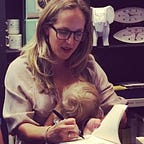The Bluest Egg
Motherhood is often a waiting game…
I found a robin’s egg,
broken, but not shattered.
I had been thinking of you,
and was kneeling in the grass
among fallen blossoms
when I saw it: a blue scrap,
a delicate toy, as light
as confetti
It’s the dead center of a very wet summer and I’m pregnant with our third child. We retreat from an urban pandemic, away from the Bay Area’s fog, to the humid marshlands of coastal New England where earthworms line the driveway waiting to desiccate and die, and the kids find a robin’s nest in the roof’s eaves.
A few weeks of watching, waiting: mother robin sitting patiently atop the messy nest. Our anthropomorphized view of her: stoic and consistent.
I feel kinship with her. This waiting. I remember the late egg days, how birth cracks you open, leaves fissures where once you were whole (torn labia, mastitis, pelvic floor dysfunction). Does she know her entire parenting life will be waiting? Waiting for them to fall asleep. Waiting for them to put on their shoes. Waiting for them to exit the school yard. Waiting for them to fly. Fly away.
Her infinite patience scratches at me like a jealous itch. Do not waste this virtue, I think to tell her, but cannot speak bird words.
One day we wake on a sunny day to see the mother departed. In her stead, two tiny bird heads, still wet from their egg lives, are visible above the nest. We visit them daily, seeking their hungry, persistent beaks searching incessantly, opening and closing like empty claw cranes, begging to be fed. Where is she, mother bird? And what of the absent father?
These bald-eyed fledglings appear to exist only on the precipice of starvation. I look for the mother robin to confide in the endless cravings of small children.
The kids wonder when the baby birds will fly off, if they’ll be safe out in the wide, winged world. But just as unceremoniously, one morning they’re gone. The mother too. We see no evidence of newly-flown birds along the entrance path or the nearby rhododendrons browned from unseasonable rains.
A few days later, the nest has spilled an egg onto the ground, which miraculously proffers a bright blue eggshell, cracked at the top only slightly for one of those small, slick bird bodies to emerge. We collect the egg and place it on the dining room table where the kids poke it with greedy fingers and I constantly admonish them not to break its fragile shell.
It didn’t seem real,
but nature will do such things
from time to time.
I looked inside:
it was glistening, hollow,
a perfect shell
except for the missing crown,
which made it possible
to look inside.
No, wait. That’s not right. I’ve rewritten this backwards, am unsure the verity of the egg’s provenance — did we find it in New England or the Philadelphia suburb near my in-laws’, weeks earlier?
A mother’s memory is viscous, slippery as albumen. This third pregnancy follows upon the heels of the others, eager to undo my brain, make me confuse their names, ages, habits…
The eggshell we find is miraculously intact on the sidewalk beneath a maple tree, an invisible nest we cannot see when looking skyward.
The patient mother — where are her eggs? And why only two birds? Didn’t she lay more?
That summer, our eldest collects an ugly assortment of natural wonders she keeps in pouches, pockets: weathered beach stones, a mangy gull feather, an acorn. I offer her the blue egg to add to her bounty; she refuses. I alone marvel at the blue — the bluest blue, as if nature indeed holds mysteries worthy of protecting, not unraveling.
Why blue?
I want to know: I read a scientific study that says male robins whose nests contain the brightest blue eggs feed their newly-hatched babies twice as much. Maybe the baby robins we meet are hungry because their eggs aren’t a brilliant enough blue.
A lifetime ago, I watched our maturing eggs on a flickering black and white screen, the infertility specialist pointing out which was readiest, when to harvest, to poke and prod — and yet this, the third, was unsuspected and unpoked. Would it be the bluest?
The mother robin never returns. Her fledglings depart to the thick birch forest behind the house where one night we heard an owl, where one winter we saw a fisher cat, her cruel, fanged grin. The abandoned nest lives on in the eaves, worthy only of a season.
I cup my hands around my belly, this tired, reusable uterus laying claim to just one more. I don’t know what happened to the blue egg, whether it was left on the table or the sidewalk; the summer wore on, the kids forgot, I packed our bags so we could fly away again.
Now I await the final crack, a splitting open I know too well. I return to the books with photographs of bald, slick heads emerging from the opening between spread legs and remember the pain — and promise — of splitting in two. Summer turns to autumn, the children start school and the house is empty: in the bedroom, clothes are scattered on the floor like fallen leaves; in the kitchen, a trail of toy cars leads from fridge to nowhere. To where did my fledglings fly?
Far away, the mother robin sits on a bare branch in winter woods, her puffed belly harboring eggs of the coolest blue.
What had been there
is gone now
and lives in my heart
where, periodically,
it opens up its wings,
tearing me apart.
##
Italicized sections are quotes from “Poem 178: End of April,” by Phillis Levin
